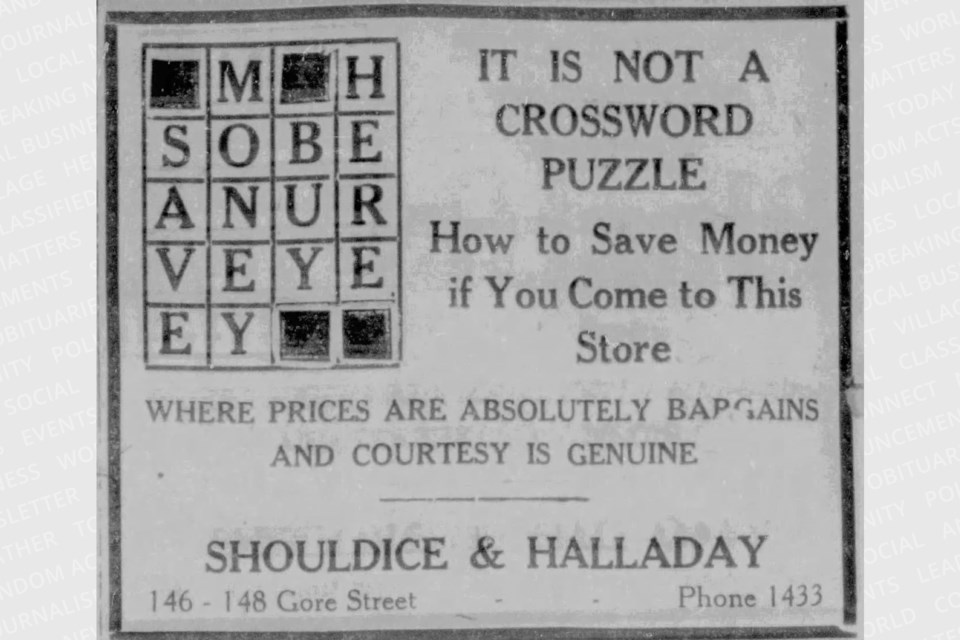From the archives of the Sault Ste. Marie Public Library:
On January 7th, 1925, the Sault Daily Star jumped on a trend sweeping the world and ran its first ever crossword puzzle.
The crossword came with some helpful hints: what the black and white squares meant, rules for the number of letters, and a suggestion about the use of pencils. They also helpfully told people not to “get scared” if they got stuck on the first clue.
The crossword itself contained 36 clues, ranging from prepositions to nursery rhyme characters, to Chinese vegetables.
By the time the Star began running puzzles, crosswords had already established themselves as a craze – not only did people rush to complete them, but newspapers also reported breathlessly on every issue or piece of puzzler drama they could track down.
In 1924, the Sault Daily Star told of a “crossword puzzle widow” in Chicago who attempted to divorce her husband for spending too much time completing crossword puzzles and not enough time providing for his family. The judge apparently thought the marriage could be saved by placing a daily limit on the husband’s crossword puzzles: he was only permitted to complete three. It was hardly the only instance of marital strife: in Toronto, a man threw a dictionary at his wife during a crossword-related dispute. In Los Angeles, a woman won the right to divorce her avid crossword fan husband after describing life with him as “just one four letter word meaning torment.”
In New York, a man served a day in jail for “obstructing business in a restaurant for three hours while he was solving a crossword puzzle.” Meanwhile, a restaurant in Ohio began including crossword puzzles with their desserts, much to their guests’ delight.
In Los Angeles, a man dislocated his jaw yawning, in what was described as LA’s “first puzzle casualty.” Opticians also warned of the risk of eyestrain and headaches caused by “overindulgence in the pastime under wrong conditions.”
In Ottawa, book circulation dropped at the local libraries, which librarians blamed on people completing crossword puzzles instead of reading. And in London, England, librarians withdrew dictionaries from the reference library due to the heavy damage they sustained at the hands of puzzle enthusiasts.
Along with these stories came a certain amount of moral panic. In Baltimore, the Maryland State Board of Mental Hygiene warned that focusing too intently on a crossword puzzle could be damaging to people’s mental health: “The puzzle craze… may yet give the psychiatrists something to think about…. Crossword puzzles wouldn’t be the first popular craze which has resulted in psychosis. While I do not know of any specific instance, it could easily happen. The constant worry and fretting over the puzzle, particularly if they are hard to solve, might easily unbalance a nervous mind.”
However, according to other articles, this fear was not necessarily born out: in one Pennsylvania psychiatric institution, doctors noted that crossword puzzles neither improved nor caused a decline in patients’ mental states, prompting the papers to say this “should comfort many a wife who fears the crossword craze may unbalance” her husband.
In the New York Tribute, a story ran regarding a reverend who was preaching against crossword puzzles. He described how at one point, the crossword puzzle had been “a sort of magic acrostic,” a charm “to keep the devil away.” However, he said that things had changed, and puzzles were “more likely to drive a person devil ward.” Other articles described the crossword puzzle as being something “heathenish.” However, some churches were much more welcoming, with at least one Mississippi church distributing puzzles to their congregation and dropping hints during the sermon in the hopes of creating a more focused audience.
Even schools like Yale jumped on the craze, with biology professors structuring their exams in crossword puzzle format.
It was in the middle of this media frenzy that the Sault Daily Star introduced crosswords as a regular feature in their papers. And, to no one’s surprise, crossword popularity took off in Sault Ste. Marie as well. Advertisements for local businesses used the iconic black and white squares to catch people’s attention in their ads. At a winter carnival, featuring ice skating and a costume contest, Mr. W. Thompson took first prize for his crossword puzzle suit. For his award-winning costume, he received a ham.
On January 17th, after less than two weeks of crosswords, the Sault Daily Star had to publish a notice to the public, informing them that there were no prizes up for grabs: “It would appear that some of our readers are under the impression that prizes are being offered for solutions of the puzzles. This is not the case.” They did, however, praise the neatness of one submission they received from Thessalon.
However, that would soon change. Businesses, including theatres, ran crossword puzzle contests, and the public completed them in droves for a chance to win tickets to a movie at the theatre, a free scooter, or a radio set. And in April, The Sault Daily Star announced a contest for adults, where “the correct and most attractively presented” solutions could win the puzzlers $1,000.
As time went on, the furor died down, and the black-and-white puzzles became a beloved – but standard – part of many people’s daily routines. Maybe you’re the sort of person who keeps their brain active with a good crossword. Or, perhaps you agree more with one of the Sault Daily Star’s opinion columnists who quipped, “Some people get wiser as they get older, and others go in for these darn puzzles.”
Each week, the Sault Ste. Marie Public Library and its Archives provide SooToday readers with a glimpse of the city’s past.
Find out more of what the Public Library has to offer at www.ssmpl.ca and look for more "Remember This?" columns here.
